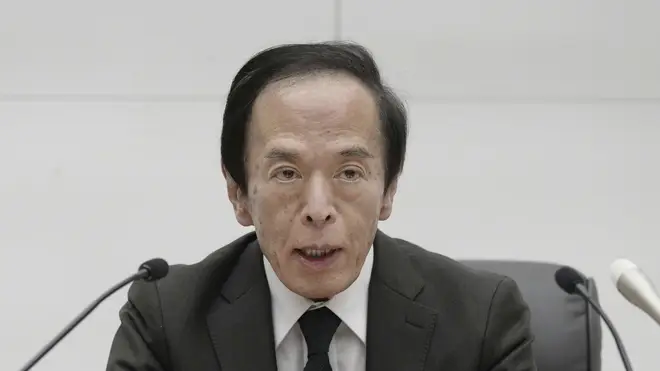
Matthew Wright 7am - 10am
19 March 2024, 08:04

The bank had promised to review its policy of negative rates and other easing measures if the 2% inflation target was met.
Japan’s central bank has raised its benchmark interest rate for the first time in 17 years, ending a policy of negative rates meant to boost the economy.
The Bank of Japan’s lending rate for overnight borrowing by banks was raised to a range of 0 to 0.1% from minus 0.1% at a policy meeting that confirmed expectations of a shift away from ultra-lax monetary policy.
It was the first rate hike since February 2007. The negative interest rate policy, combined with other measures to inject money into the economy and keep borrowing costs low, “have fulfilled their roles”, Bank of Japan Governor Kazuo Ueda told reporters.
The bank has an inflation target of 2% that it used as a benchmark for whether Japan had finally escaped deflationary tendencies.
But it had remained cautious about “normalising” monetary policy, or ending negative borrowing rates, even after data showed inflation at about that rate in recent months.
Mr Ueda said there was “a positive cycle” of a gradual rise of wages and prices while stressing that monetary policy will remain easy for some time.
Although private sector banks and other financial organisations will make their own decisions about rates, he said did not foresee any drastic rises. The central bank will watch for any big moves in rates, which would cause confusion, he added.
“We made the decision because we foresaw stable and continuous 2% inflation,” he added.
Another factor supporting the shift is that Japanese companies have announced relatively robust wage hikes for this year’s round of negotiations with trade unions.
Wages and profits at companies are improving, the Bank of Japan said, in releasing its latest decision, referring to “anecdotal” accounts as well as data it had gathered lately.
“Japan’s economy has recovered moderately,” it said.
Market reaction was muted as the decision had been anticipated after Japanese media reports earlier this week. Tokyo’s benchmark Nikkei 225 index gained nearly 0.7% on Tuesday while the dollar was steady at about 150 yen.
Analysts said the bank is unlikely to change its overall easy lending framework and will closely monitor prices.
Harumi Taguchi, principal economist at S&P Global Market Intelligence, said she believes inflation could begin falling below 2% and wage increases may not necessarily lead to robust consumer spending if people choose to save, rather than spend.
“While the bank’s decisions will contribute to improving the functioning of financial markets, the impact on the real economy is likely to be limited,” according to analysis by S&P Global Market Intelligence.
Mr Ueda had repeatedly said the central bank would review its negative rate and other easing measures if the 2% inflation target was met and was accompanied by wage increases.
The Japanese central bank’s policy is quite different from those of the US Federal Reserve and the European Central Bank. Both have been moving to lower interest rates after rapidly raising them to clamp down on inflation.
The Bank of Japan has kept borrowing costs extremely low for many years to encourage Japanese consumers and businesses to spend and invest to help sustain stronger economic growth.
Japan recently became the world’s fourth biggest economy, slipping behind Germany in terms of its nominal gross domestic product, or GDP. The US economy is the largest, followed by China, which overtook Japan over a decade ago.